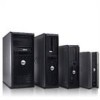Dell OptiPlex 745c Client Systems Management Administrator's Guide - Page 14
USB Drive Key Requirements, AMT WebGUI - memory
 |
View all Dell OptiPlex 745c manuals
Add to My Manuals
Save this manual to your list of manuals |
Page 14 highlights
b Inserts the USB drive key into a platform. c Turns on that platform. 6 The system BIOS detects the USB drive key. • If found, the BIOS looks for a Setup.bin file at the beginning of the drive key. Go to step 7. • If no USB drive key or Setup.bin file is found, then restart your system. Ignore the remaining steps. 7 The system BIOS displays the message Found USB key for provisioning Intel® AMT, Continue with Auto Provisioning (Y/N). Select Y. a The first available record in the Setup.bin is read into memory. The process: • Validates the file header record. • Locates the next available record. • Invalidates current record so it cannot be used again. b The process places the memory address into the MEBx parameter block. c The process calls MEBx. 8 MEBx processes the record. The message Intel® AMT Provisioning complete is displayed. 9 The IT technician powers down the system. The system is now in setup state and is ready to be distributed to users in an Enterprise mode environment. 10 Repeat step 5 if necessary (more than one system). Refer to your management console supplier for more information on USB drive key set up and configuration. USB Drive Key Requirements The USB drive key must meet the following requirements to be able to setup and configure AMT: • It must be greater than 16MB. • It must be formatted with the FAT16 file system. • The sector size must be 1KB. • The USB drive key is not bootable. • The Setup.bin file must be the first file landed on the USB drive key. AMT WebGUI The Intel AMT WebGUI is a web browser-based interface for limited remote system management. The WebGUI is often used as a test to determine if AMT setup and configuration was performed properly on a system. A successful remote connection between a remote system and the host system running the WebGUI indicates proper AMT setup and configuration on the remote system. 14 Client Systems Management Administrator's Guide















